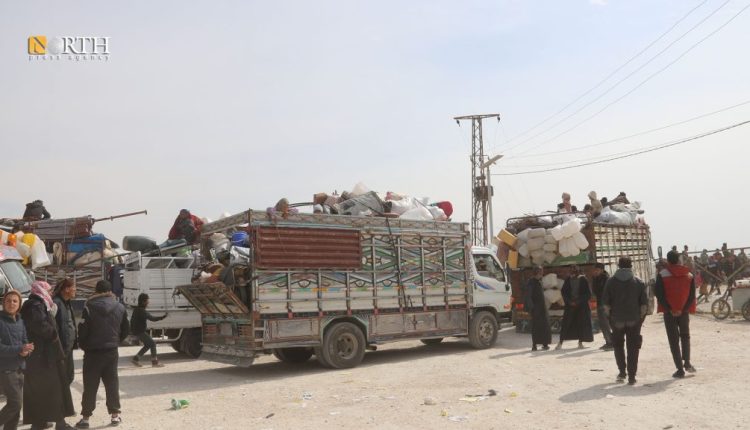Dozens of Families Leave al-Arisha Camp in Northern Syria as Repatriation Efforts Expand
By Kardo Roj
HASAKAH, Syria (North Press) – Thirty-two displaced Syrian families departed al-Arisha Camp, also known as al-Sadd Camp, in the southern countryside of Hasakah on Wednesday, returning to their original homes in Deir ez-Zor and its surrounding countryside as part of ongoing repatriation efforts in northeast Syria.
The head of the camp’s co-administration, Salwa Jajo, told North Press that 178 individuals were part of this latest group to leave, marking the fourth official batch of returns since the process began. The return initiative is coordinated by the Autonomous Administration of North and East Syria (AANES) in cooperation with humanitarian agencies, including the United Nations High Commissioner for Refugees (UNHCR).
Mid-April saw a similar group of 88 people from ten families depart the same camp for Deir ez-Zor, highlighting a growing push to facilitate voluntary returns under improved conditions.
“This is the second return mission conducted under UNHCR’s auspices,” said Jajo. “The effort is part of a broader strategy to enable displaced people to go back home in a dignified and safe manner.”
Prior to the latest departures, al-Arisha Camp hosted over 14,000 individuals. According to camp officials, the number has now dropped to around 12,000—most of whom are from Deir ez-Zor Governorate, an area that witnessed prolonged battles against the Islamic State (ISIS) and remains under varying degrees of control and stability.
The returns come amid ongoing stabilization efforts in parts of Deir ez-Zor previously affected by ISIS occupation and subsequent military campaigns. The Syrian Democratic Forces (SDF), in cooperation with the Global Coalition, have maintained security operations in eastern Syria, targeting remnants of ISIS cells while supporting local councils to rebuild essential infrastructure.
While challenges persist—particularly in areas outside AANES governance—improvements in basic services and local security have encouraged some families to consider returning. Humanitarian organizations working in the region emphasize the need for continued support to ensure returnees have access to clean water, healthcare, and education.
The repatriation process is supervised jointly by AANES institutions and international humanitarian agencies, ensuring that returns are voluntary and conditions in receiving areas are monitored. Each departing family undergoes an assessment process and receives logistical support for the journey back to their home regions.
Local authorities view the return of displaced persons as a key step toward relieving pressure on camp infrastructure and restoring demographic stability in affected towns and villages. Al-Arisha Camp, one of the largest camps in Hasakah Governorate, has served as a temporary refuge for thousands of families fleeing conflict in Syria’s east.
As security continues to improve in parts of Deir ez-Zor and neighboring regions, AANES-affiliated bodies and international partners are expected to scale up repatriation operations in the coming months. The experience from al-Arisha Camp is likely to serve as a model for similar efforts elsewhere in northeast Syria.
While the process remains complex—given ongoing political fragmentation, economic strain, and post-conflict recovery needs—the gradual return of displaced families signals cautious optimism about prospects for stability and reintegration in parts of the country once devastated by war.
For many families, returning home represents more than just a geographic relocation—it is a step toward reclaiming a sense of normalcy, identity, and hope for the future.

